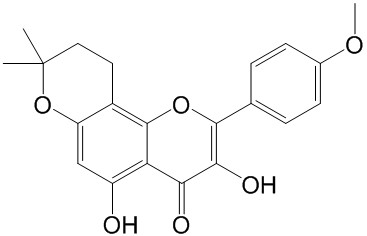Home
Products
Icaritin



| Product Name | Icaritin |
| Price: | Inquiry |
| Catalog No.: | CN05394 |
| CAS No.: | 118525-40-9 |
| Molecular Formula: | C21H20O6 |
| Molecular Weight: | 368.38 g/mol |
| Purity: | >=98% |
| Type of Compound: | Flavonoids |
| Physical Desc.: | Yellow powder |
| Source: | The roots of Epimedium brevicornu Maxim. |
| Solvent: | Chloroform, Dichloromethane, Ethyl Acetate, DMSO, Acetone, etc. |
| SMILES: | COc1ccc(cc1)c1oc2c(CC=C(C)C)c(O)cc(c2c(=O)c1O)O |
| Contact us | |
|---|---|
| First Name: | |
| Last Name: | |
| E-mail: | |
| Question: | |
| Description | Icaritin(Anhydroicaritin) is a component of Epimedium flavonoid isolated from Herba Epimedii; enhances osteoblastic differentiation of mesenchymal stem cells (MSCs) while it inhibits adipogenic differentiation of MSCs by inhibiting PPAR-g pathway.IC50 value:Target: in vitro: Icaritin was unable to promote proliferation, migration and tube like structure formation by human umbilical vein endothelial cells (HUVECs) in vitro [1]. Icaritin potently inhibited proliferation of K562 cells (IC50 was 8 μM) and primary CML cells (IC50 was 13.4 μM for CML-CP and 18 μM for CML-BC), induced CML cells apoptosis and promoted the erythroid differentiation of K562 cells with time-dependent manner. Furthermore, Icaritin was able to suppress the growth of primary CD34+ leukemia cells (CML) and Imatinib-resistant cells, and to induce apoptosis [2]. icaritin strongly inhibited the growth of breast cancer MDA-MB-453 and MCF7 cells. At concentrations of 2-3 μM, icaritin induced cell cycle arrest at the G(2)/M phase accompanied by a down-regulation of the expression levels of the G(2)/M regulatory proteins such as cyclinB, cdc2 and cdc25C. Icaritin at concentrations of 4-5 μM, however, induced apoptotic cell death characterized by the accumulation of the annexin V- and propidium iodide-positive cells, cleavage of poly ADP-ribose polymerase (PARP) and down-regulation of the Bcl-2 expression [3].in vivo: In mouse leukemia model, Icaritin could prolong lifespan of NOD-SCID nude mice inoculated with K562 cells as effective as Imatinib without suppression of bone marrow. Icaritin could up-regulate phospho-JNK or phospho-C-Jun and down-regulate phospho-ERK, phospho-P-38, Jak-2, phospho-Stat3 and phospho-Akt expression with dose- or time-dependent manner [2]. |
| Density | 1.4±0.1 g/cm3 |
| Boiling Point | 582.0±50.0 °C at 760 mmHg |
| Flash Point | 206.7±23.6 °C |
| Exact Mass | 368.125977 |
| PSA | 100.13000 |
| LogP | 4.84 |
| Vapour Pressure | 0.0±1.7 mmHg at 25°C |
| Storage condition | 2-8°C |